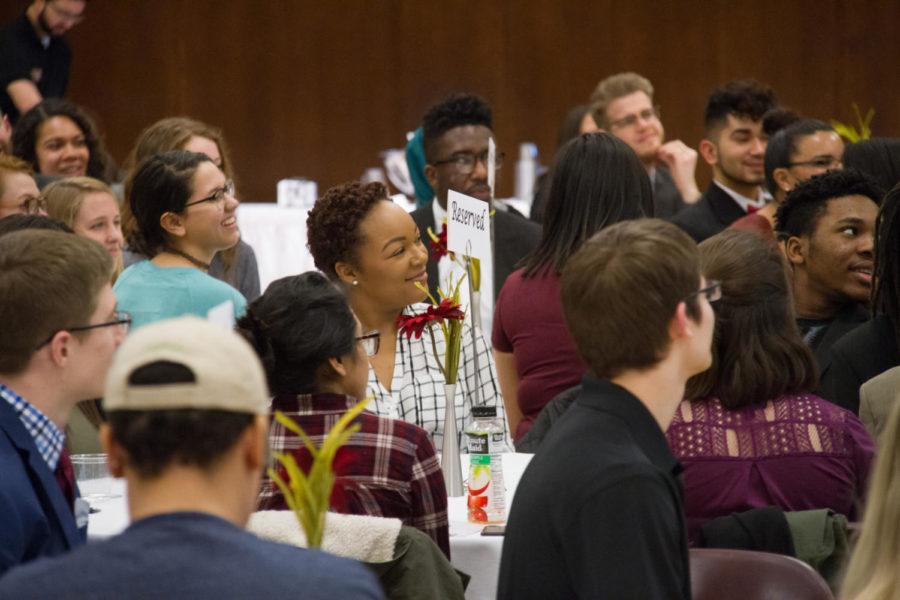ISCORE Conference timeline
Students and staff gather for closing remarks during ISCORE, March 3 in the Memorial Union.
March 5, 2017
The 2017 Iowa State Conference on Race and Ethnicity, also known as ISCORE, took place Friday. The conference is modeled after a national conference, called NCORE, and student delegates from Iowa State shared what they learned at NCORE at the ISCORE conference on campus. Here’s a timeline of the event and how it has developed here at Iowa State.
2000: The first ISCORE conference occurs at Iowa State, after Thomas L. Hill, then-senior vice president for student affairs, implemented it. The first conference included keynote speakers from the director of minority student affairs, the vice president of human resources/head of affirmative action and the president of the university. The day went on to include workshops run by university faculty about understanding diversity and race in social settings and across campus.
2001: The ISCORE conference was an all-day event in 2001, running from 7:30 a.m. to midnight as opposed to the previous year, when it ran from 7:30 a.m. to 4 p.m. The event featured only one keynote speaker but still featured the same types of workshops led by university faculty. The event ended with spoken word poetry performances and a dance party.
2005: The sixth annual ISCORE conference featured a session on the new name for the Office of Minority Student Affairs, which was renamed the Multicultural Student Affairs Office. The change stemmed from a 2004 survey that found the majority of students found the word “minority” offensive on some level. The MSA staff hosted a forum facilitating discussion of the new name, with a focus on the population the office served, including multiracial and international students, as well as white allies.
2006: The ISCORE conference featured a keynote speech on the future of the conference, as well as a keynote from the program artist Brenda Jones, associate professor of art and design, whose artwork has been featured on the cover of the ISCORE program since the first conference. The day featured sessions on special education for African-American men, the Multicultural Greek Council and a reader’s theatre from women in the Women’s Studies 450/550X class.
2007: The conference featured keynotes and workshops that branched further out into examinations of white privilege, with one of the sessions focusing on being a minority athlete at a largely white school. Another session focused on Iowa State’s new discrimination and harassment policies that went into effect on May 1, 2006.
2009: The 2009 ISCORE marked the 10th ISCORE conference and featured a keynote speaker who offered a continued call to action about diversity and race relations on campus, and honored both the ISCORE committee and the students who participated in the NCORE conference.
2010: The 2010 ISCORE keynote speaker was Luis Rico-Gutierrez, dean of the College of Design. Gutierrez served on the architecture faculty at Carnegie Mellon University and served as their associate dean of the College of Fine Arts. Gutierrez is also accredited in Mexico and Spain, and conducted research in the use of information technology in design and grassroots practices in urban design.
2011: The 2011 conference featured the return of a session on minority athletes in white schools, but also featured many sessions focusing on minority women, from Muslim women in high education to minority women shattering stereotypes overall.
2012: This was President Leath’s first ISCORE conference. The conference featured a session that laid out a plan for improving the campus climate for minority students and faculty after a 2004 assessment. The session explored the Implementation Plan and the challenges that lay ahead for putting it in practice.
2013: The 2013 ISCORE marked the second year that the Brenda Jones Change Agent Award would be awarded to an ISCORE participant. The award was created to honor Brenda Jones, professor in the College of Design, who had also created 14 original works for the last 14 ISCORE conferences. David Romero was the 2013 recipient of the award.
2016: The colleges of design and liberal arts and sciences were elected to serve as the year’s NCORE/ISCORE Champions. These two colleges were chosen due to their efforts in improving and promoting diversity, as well as welcoming students of all backgrounds in their programs. That year, Markus Flynn was awarded the Brenda Jones Change Agent Award.







